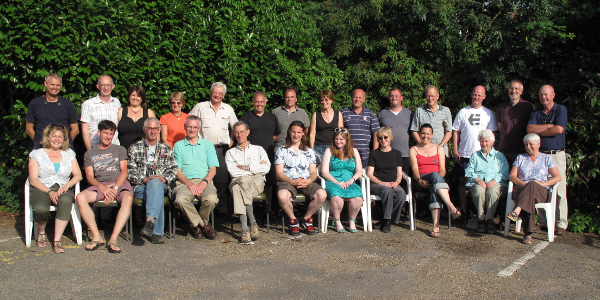The Group
Members past and present gathered to celebrate 50 years of RMRG
(click image to enlarge)
The RMRG is run entirely by volunteers, and operates when members are available. Although we are subject to the supervision of the British Trust for Ornithology (BTO), we are entirely self-financing, and rely on the support of Members and Friends, as well as occasional grants and sponsorships. Please support us if you value our work.
Our activities are various: besides ringing, and general observations and recording of the birds of the site, the Group works with the other Rye Meads Partners to manage the habitat to a formal long-term Management Plan, with regular cutting and clearing; maintains large numbers of nest boxes; and maintains our ringing laboratories and equipment, permanent duck traps, a variety of mobile traps and mist nets, and a substantial library of reference works in support of identification, ageing and sexing of birds in the hand.
Scientific activities
General ringing
Year round, we aim to conduct the ringing of full-grown birds trapped mainly with "mist nets" and duck traps. Each full-grown bird caught or retrapped is taken to a fully equipped ringing laboratory, where it is examined to identify its age and sex, where possible, and biometric measurements are taken.
Breeding surveys
Each year, we conduct a full breeding survey of the entire site, to establish as far as possible the number of breeding territories and, where possible, evidence of breeding success for each species occuring on site. Every nest found is recorded in detail for the BTO's Nest Records Scheme - we have completed to date over 14,000 Nest Record Cards for 78 species. We also ring the nestlings, or "pulli" - these are particularly valuable contributions to our knowledge, as we know for these birds precisely their age and origin.
Constant Effort ringing
The Group has also contributed since 1993 to the BTO's Constant Effort Sites project, whereby consistent and regular bird trapping over a number of years at many sites all over the country can yield information on national population trends.
Training new ringers
Another important activity which the Group undertakes is the training of new bird ringers. All ringers are licensed by the Government under a scheme administered by the BTO, and to reach the necessary degree of competence to ring unsupervised takes a long and painstaking apprenticeship. The Group has qualified Trainers and supports a number of trainee ringers at any one time. If you are interested in training to become a ringer, there's more information on our Support Us page.
Our data and data requests
Since 1961, we have monitored the birds and other wildlife on site by recording our sightings into a daily log - for which we average at least two complete logs per week. These data are now stored electronically in BirdTrack and are sent through to the County Recorder. As mentioned above, we carry out annual, extensive, breeding bird surveys and general, as well as structured, bird ringing. This substantial base of data has been used for many scientific papers, notably in our regular Reports - for a list of papers, see here.
All RMRG data are available to academics and researchers working in the conservation sector and we would be pleased to see our data used in scientific work. We have a Data Terms Policy available on request. Please do get in touch if these data are of interest to you and your studies.

